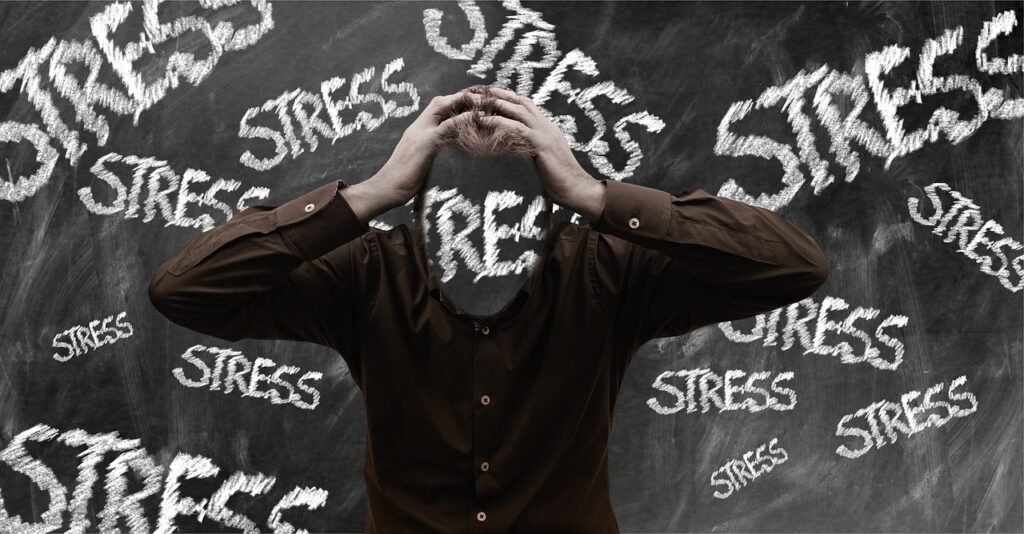
Understanding Stress in the Workplace
Workplace stress is a growing concern, particularly in high-pressure environments where tight deadlines, high expectations, and long working hours are the norm. Defined as the adverse reaction individuals have to excessive pressures or other types of demand placed upon them, workplace stress can manifest in various forms, impacting both mental and physical health.
In high-pressure work settings, employees often face significant challenges that can lead to increased stress levels. Common causes include the need to meet stringent deadlines, the constant pressure to perform at a high level, and extended working hours that encroach upon personal time. For instance, a study conducted by the Health and Safety Executive (HSE) in the UK found that 17.9 million working days were lost due to work-related stress, depression, or anxiety in 2019/20. This statistic highlights the substantial impact that stress can have on workforce productivity and overall well-being.
The implications of unmanaged workplace stress are far-reaching. Mentally, it can result in conditions such as anxiety, depression, and burnout, severely affecting an individual’s capacity to perform their duties effectively. Physically, prolonged stress can lead to adverse health conditions like hypertension, cardiovascular diseases, and a weakened immune system. According to the HSE, stress, depression, or anxiety accounted for 51% of all work-related ill health cases in the UK, underscoring the critical need for effective stress management strategies.
Understanding the nature of workplace stress and its common causes is the first step in addressing this pervasive issue. By recognizing the signs and acknowledging the impact of stress on both mental and physical health, employers and employees alike can take proactive measures to create a healthier, more supportive work environment. This approach not only enhances individual well-being but also contributes to improved organizational performance and sustainability.
Recognizing the Signs of Stress

In a high-pressure work environment, recognizing the signs of stress is crucial for maintaining both mental and physical well-being. Stress manifests in various ways, and the symptoms can differ widely from person to person. Understanding these signs is the first step towards managing stress effectively.
Physical symptoms of stress often include headaches, fatigue, and muscle tension. Headaches, particularly tension headaches, are a common response to prolonged stress. Fatigue, or a persistent feeling of tiredness, can stem from the body’s constant state of alertness, which drains energy. Additionally, muscle tension, particularly in the neck and shoulders, can be a physical indication of stress.
Emotional symptoms may be more subtle but are equally important to recognize. Anxiety and irritability are common emotional responses to stress. Anxiety can manifest as excessive worry or nervousness, while irritability may cause individuals to become easily frustrated or angered by minor issues. These emotional states can significantly impact daily interactions and overall workplace morale.
Another critical indicator of stress is decreased productivity. When under stress, individuals often find it challenging to concentrate, leading to a drop in efficiency and effectiveness in their work. This decline in productivity can create a feedback loop, where the stress of uncompleted tasks leads to further stress.
Given the variety of stress symptoms, it is essential for individuals to self-assess regularly. Being aware of these signs allows for early intervention, which can prevent stress from escalating into more severe health issues. Encouraging a culture of self-awareness and open communication about stress can play a significant role in creating a supportive work environment.
Recognizing the signs of stress is a foundational step in managing it. By identifying physical and emotional symptoms early, individuals can take proactive steps to mitigate the negative impacts of stress and maintain a healthier, more productive work life.
In high-pressure work environments, immediate stress relief techniques can be crucial for maintaining productivity and mental well-being. One effective strategy is the use of stress balls. These small, squeezable objects can help alleviate tension by engaging the muscles in your hands and promoting relaxation. The repetitive motion of squeezing and releasing a stress ball can act as a physical outlet for stress, making it a simple yet effective tool for managing stress at work. Incorporating a stress ball into your daily routine is easy; keep one at your desk and use it during breaks or while on calls.
Deep breathing exercises offer another quick and accessible method for immediate stress relief. By focusing on your breath, you can reduce anxiety and lower your heart rate. A simple deep breathing exercise involves inhaling slowly through your nose for a count of four, holding the breath for four counts, and then exhaling through your mouth for a count of six. Repeat this process several times to feel more relaxed and centered. This technique can be practiced discreetly at your desk, making it ideal for a busy work environment.
Short walks are another practical approach to managing stress. Taking a brisk five to ten-minute walk can help clear your mind, improve your mood, and increase your energy levels. Walking stimulates the production of endorphins, which are natural mood lifters. Incorporating short walks into your daily routine can be as simple as taking a stroll around the office building or stepping outside for some fresh air during lunch breaks.
Mindfulness practices, such as meditation and mindful breathing, can also be effective in reducing stress. Mindfulness involves being fully present in the moment and can be practiced through simple exercises like focusing on your breath or observing your surroundings without judgment. Even a few minutes of mindfulness can help reduce stress levels and improve focus. To incorporate mindfulness into your daily routine, consider setting aside a few minutes each day to practice, perhaps during a scheduled break or before starting your workday.
Long-Term Stress Management Strategies

Managing stress effectively in a high-pressure work environment requires a long-term commitment to healthy habits and lifestyle choices. One of the most crucial aspects of long-term stress management is maintaining a healthy work-life balance. This balance ensures that work responsibilities do not encroach upon personal time, allowing for relaxation and mental rejuvenation. Setting clear boundaries between work and personal life can prevent burnout and promote overall well-being.
Regular physical exercise is another essential strategy for managing stress over the long term. Exercise has been shown to reduce levels of the body’s stress hormones, such as adrenaline and cortisol. Additionally, it stimulates the production of endorphins, chemicals in the brain that act as natural painkillers and mood elevators. Engaging in activities such as walking, jogging, yoga, or any form of physical activity that one enjoys can significantly mitigate stress.
Proper nutrition also plays a pivotal role in stress management. A well-balanced diet that includes a variety of nutrients can help stabilize mood and energy levels. Consuming foods rich in omega-3 fatty acids, such as salmon and walnuts, and incorporating plenty of fruits, vegetables, and whole grains can enhance cognitive function and reduce stress. Avoiding excessive caffeine and sugar, which can lead to energy crashes and heightened anxiety, is equally important.
Getting sufficient sleep is another cornerstone of long-term stress management. Quality sleep helps the body recover from the day’s activities, and a lack of it can exacerbate stress and impair cognitive function. Establishing a regular sleep routine, creating a restful sleeping environment, and avoiding screens before bedtime can improve sleep quality.
In addition to these lifestyle changes, effective time management and task prioritization are essential. Learning to set realistic goals, delegating tasks when necessary, and focusing on one task at a time can reduce the overwhelming feeling of having too much to do. Utilizing tools such as planners or digital apps to organize tasks can greatly enhance efficiency and reduce stress.
By integrating these strategies into daily life, individuals can cultivate sustainable habits that significantly reduce stress and contribute to a healthier, more balanced lifestyle.
The Role of Stress Tablets and Supplements

In the landscape of stress management, stress tablets and supplements have garnered attention as potential tools for alleviating the pressures of a high-stress work environment. The UK market offers a variety of stress-relief supplements, each with its own set of benefits and potential side effects. Understanding the different types of these supplements can help individuals make informed decisions.
One popular category includes herbal supplements such as valerian root, passionflower, and chamomile, which are traditionally known for their calming effects. These natural remedies are often chosen for their ability to promote relaxation and improve sleep quality, which can indirectly reduce stress levels. Additionally, adaptogens like ashwagandha and rhodiola rosea are renowned for their ability to help the body adapt to stress and restore balance.
Another category is comprised of vitamins and minerals, crucial for overall well-being. B-complex vitamins, for instance, play a significant role in maintaining a healthy nervous system and can help manage stress by supporting energy levels and brain function. Magnesium is another essential mineral known to regulate neurotransmitters that influence mood and stress response.
While these supplements can offer benefits, it is important to acknowledge potential side effects. Herbal supplements, though natural, can interact with medications or cause allergic reactions in some individuals. Overuse of certain vitamins and minerals can lead to toxicity and adverse health effects.
Considering stress tablets and supplements should be approached with care. It is advisable to consult with a healthcare professional before starting any new supplement regimen. A professional can provide personalized advice, considering an individual’s specific health conditions, current medications, and overall lifestyle. This consultation ensures that the chosen supplements are not only effective but also safe.
Incorporating stress tablets and supplements can be a beneficial component of a holistic stress management strategy. However, they should complement, not replace, other stress-reducing practices such as regular exercise, adequate sleep, and mindfulness techniques.
Creating a Supportive Work Environment

A supportive work environment is paramount in managing stress, especially in high-pressure settings. The foundation of such an environment lies in fostering a culture of open communication. Encouraging employees to voice their concerns and feedback without fear of reprisal can significantly alleviate stress. This open dialogue not only helps in identifying potential stressors but also fosters a sense of belonging and respect among team members.
Support networks within the workplace are equally crucial. Establishing formal and informal support structures, such as peer mentoring programs and team-building activities, can create a more collaborative and understanding environment. Peer mentoring, in particular, allows employees to share experiences and coping strategies, reducing the feeling of isolation that often accompanies workplace stress.
Employers and HR departments play a pivotal role in recognizing and addressing workplace stress. Regular stress assessments and surveys can help identify stress hotspots and inform the development of targeted interventions. Training managers to recognize the signs of stress and provide appropriate support can also make a significant difference.
Implementing employee wellness programs is another effective strategy. These programs can include activities such as yoga, mindfulness sessions, and workshops on stress management techniques. Wellness programs not only help in reducing stress but also in enhancing overall employee satisfaction and productivity.
The benefits of a supportive work environment extend beyond individual well-being. Companies that prioritize employee mental health often see higher levels of engagement, morale, and retention. In high-pressure work environments, where stress can easily become overwhelming, creating a supportive and collaborative culture is not just beneficial but essential for sustaining long-term success.
When to Consider Workplace Stress Leave

Recognizing when workplace stress becomes unmanageable is crucial for maintaining both mental and physical health. Workplace stress leave is a provision allowing employees to take time off to recover from severe stress impacting their job performance and well-being. In the UK, employees are legally entitled to this leave if their stress levels have reached a point where it significantly affects their ability to work.
Workplace stress leave typically involves obtaining a fit note from a General Practitioner (GP), which states that the employee is not fit for work due to stress-related issues. This note is then presented to the employer, who must adhere to the legal requirement of providing the necessary leave. Employees have the right to confidentiality and should not face discrimination or negative repercussions for taking stress leave.
Approaching the topic of stress leave with an employer requires a thoughtful and honest conversation. It is advisable to schedule a private meeting and clearly articulate the impact of stress on one’s health and work performance. Providing documentation from a healthcare professional can help substantiate the need for leave. Employers are generally required to accommodate such requests and may offer additional support, such as temporary adjustments to workload or access to mental health resources.
Taking stress leave offers several benefits, including the opportunity to recharge and refocus. It allows individuals to address underlying stressors through rest, therapy, or other coping strategies, ultimately leading to improved overall well-being and productivity. Additionally, it can prevent burnout, reduce the risk of long-term health issues, and enhance job satisfaction upon return to work. Recognizing the need for and taking advantage of workplace stress leave is a proactive step towards maintaining a healthy work-life balance and ensuring sustainable career success.
Additional Resources and Support

Managing workplace stress is a multifaceted challenge that often requires external support and additional resources. For individuals in the UK, several helplines and counselling services offer valuable assistance. The Samaritans provide a 24/7 helpline for immediate support, reachable at 116 123. Similarly, Mind, a leading mental health charity, offers services that include a helpline (0300 123 3393) and a variety of online resources tailored to managing stress and mental health issues.
For more structured counselling, the British Association for Counselling and Psychotherapy (BACP) offers a directory of qualified therapists, making it easier to find professional help tailored to individual needs. Additionally, the NHS provides free mental health services which can be accessed through GP referrals. For those who prefer online resources, platforms like BetterHelp and Talkspace offer online counselling sessions, allowing for flexible and private consultations.
Reading can also be a powerful tool in managing stress. Books such as “The Stress Solution” by Dr. Rangan Chatterjee and “The Happiness Trap” by Dr. Russ Harris offer practical advice grounded in scientific research. Articles and blogs from reputable sources like Psychology Today and the Harvard Business Review often provide insights and strategies for reducing workplace stress.
Moreover, leveraging online communities and forums can offer peer support, with platforms like Reddit’s r/stress and HealthUnlocked providing spaces to share experiences and advice. It is crucial to remember that seeking professional help is a sign of strength, not weakness. Utilizing these resources can significantly contribute to better stress management and overall mental well-being

